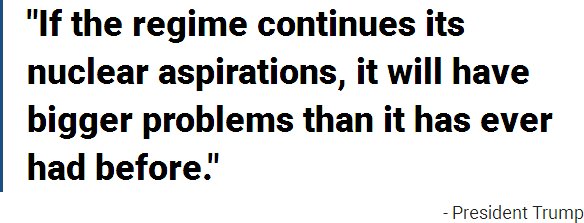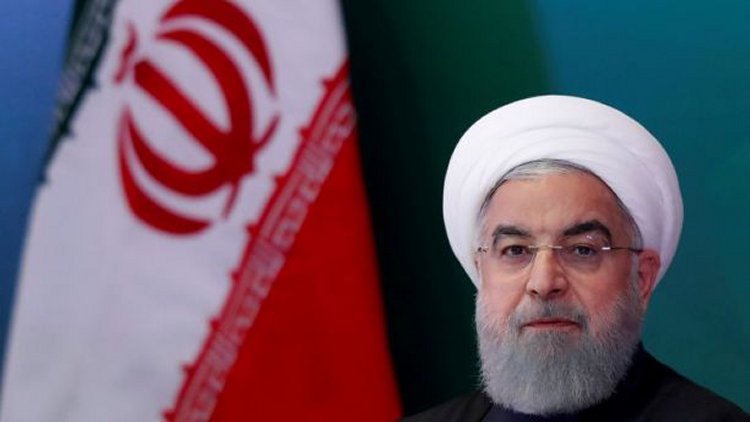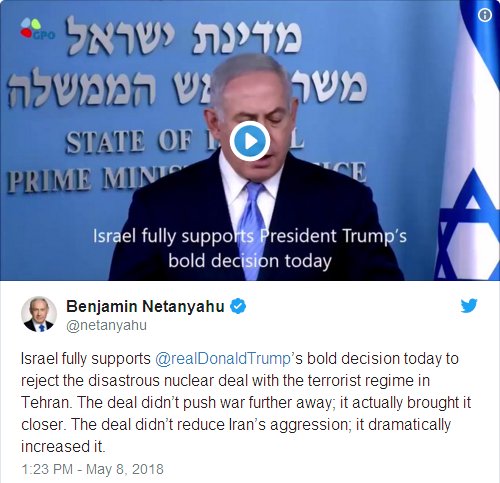
| President Trump announces US will leave Iran nuclear deal Trump says the 'horrible, one-sided' JCPOA didn't bring peace and won't prevent Iran from getting a nuclear weapon, says the U.S. will reinstitute powerful sanctions on Iran. |
President Trump is withdrawing the U.S. from the controversial Iran nuclear deal and imposing greater sanctions on the Middle Eastern nation, he said from the White House on May 8.
Calling the 2015 landmark accord "decaying and rotten," Trump said the U.S. would "not be held hostage to nuclear blackmail" and promised to reinstate the highest level of sanctions on Iran. For months, Trump left open whether he would move to officially scrap the agreement or renegotiate it.
The deal, known as the Joint Comprehensive Plan of Action (JCPOA), had lifted most U.S. and international sanctions on Tehran as certain restrictions were placed on Iran's nuclear program. The historic agreement was reached by Iran and several world powers, including the U.S., in 2015 under Barack Obama's presidency.
But with his decision to scorch the deal, here's a look at what happens next.
Trump is expected to reimpose all of the sanctions on Iran that were lifted as part of the 2015 deal, according to the Treasury Department. Some sanctions would be reimposed based on a 90-day timeframe and others on a 180-day period.
Those sanctions include precious metals, banknotes, shipping, the automotive sector and petroleum, according to guidance from the Treasury Department.

"As we exit the Iran deal, we will be working with our allies to find a real, comprehensive and lasting solution to the Iranian nuclear threat. This will include efforts to eliminate the threat of Iran's ballistic missile program, to stop its terrorist activities worldwide and to block its menacing activity across the Middle East," Trump said. "In the meantime, powerful sanctions will go into full effect. If the regime continues its nuclear aspirations, it will have bigger problems than it has ever had before."
 Iranian President Hassan Rouhani plans to negotiate with other countries that are a part of the agreement following President Trump's announcement. (Reuters/Danish Siddiqui) |
Iranian President Hassan Rouhani will send his foreign minister to negotiate with countries remaining in the deal following Trump's announcement, according to The Associated Press.
Rouhani warned that his country could restart enriching uranium "in the next weeks." If that happens, and the deal collapses completely, businesses and banks doing business with Iran would have to scramble to extricate themselves or run afoul of the U.S.
But Rouhani said the agreement could survive without the participation of the U.S. Iran likely hopes the European Union will pass laws to protect European firms from any potential U.S. sanctions.
"If at the end of this short period, we've concluded that we are able to achieve our demands in the deal, the deal will survive," Rouhani said.
Israeli Prime Minister Benjamin Netanyahu praised Trump for his decision to pull out of the agreement. He previously urged the president to abandon the deal.
"I said it from the start — it has to be either fully fixed or fully nixed," Netanyahu said before Trump's announcement. "But if you do nothing to this deal, if you keep it as is, you will end up with Iran with a nuclear arsenal in a very short time."

However, after Trump's proclamation, Israel's military said its forces were on high alert and urged civilians in the Golan Heights area near Syria to prepare bomb shelters. The possibility of the nuclear deal collapsing completely raised concerns it might embolden Iran to strike Israeli targets.
The military also said it called up some reservists but did not elaborate.
The international crude oil market was sacked with uncertainty ahead of Trump's decision, The Washington Post reported.
According to OilPrice.com, prices dropped early on the day of the president's announcement. WTI Crude was down 3.65 percent, and Brent Crude was down 3.02 percent.
Trump's decision to reinstate sanctions could hinder future projects, according to The Washington Post. For example, the French oil company Total agreed to a 20-year deal with the National Iranian Oil Co. Signed in 2017, the deal, which includes China National Petroleum Corp., is a $2 billion undertaking that would create two subsea pipelines and 30 wells, The Post reported.
However, analysts told CNBC the impact of the reimposed sanctions might not have the same impact it once did. And while some countries may limit their oil purchases from Iran out of respect to the U.S., there are other countries that might refuse to do so, according to CNBC.
Iran's crude output has risen by about 800,000 barrels per day, since January, making it the sixth-largest oil-producing country in the world, according to Fox Business. Most of its oil is reportedly purchased by Asia.
Fox News' Alex Pappas, John Roberts and The Associated Press contributed to this report.